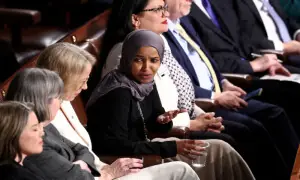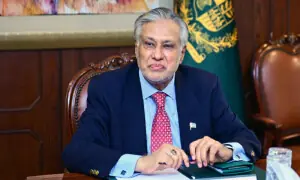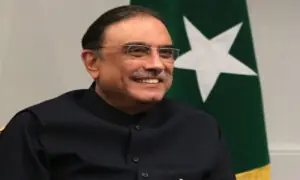No final decision yet on banning PTI, says law minister
6 min readLaw Minister Azam Nazeer Tarar has clarified that there was no final decision on banning former prime minister Imran Khan’s PTI, citing that coalition partners would be consulted before any such step.
“This is a suggestion and further discussion will be held with coalition partners. Later, people on the legal side will be asked approached,” he said while appearing on Spotlight with Munizae Jahangir which was aired on Aaj News on Wednesday.
Earlier this week, Deputy Prime Minister Ishaq Dar and Defence Minister Khawaja Asif also spoke on the same wavelength.
This came after Information Minister Attaullah Tarar announced that the federal government would approach the Supreme Court to ban the PTI because of the May 9 events and foreign funding case.
Tarar revealed that such a suggestion had also come when the foreign funding case decision was announced, however, the government showed restraint and delayed it.
He reiterated that Article 17 (freedom of association) of the Constitution and Section 212 of the Election Act allowed the government to make such decisions.
“It will be a well-thought-of inclusive decision in consultation with other political parties that are in the ruling alliance,” Tarar said and stated that the suggestion could be considered as the “start of the process”.
He said: “It’s a process which has been ignited to have a discussion on this. Like a show cause notice, why not this way should be considered.”
When asked whether PML-N President Nawaz Sharif was consulted before this, Tarar said that he was not in a position to answer it as he has been in Lahore for the past two days and has not met with the PML-N president and the prime minister.
“I am sure if the information minister has said this then he had clearance from the party’s senior leadership. This is not possible that he had spoken this on his own.”
Tarar went on to add that he was consulted on such a step during the PDM tenure. “It was decided that it should not happen,” the law minister said and added that the “material” was available to support the step. “It is the government’s prerogative to take this decision. A case can be registered if it is linked to a foreign funding case and May 9 events. It would be a legal-cum-political decision and a decision will be taken after seeing all contours.”
When asked if the parent law of Article 17 contradicted the Election Act law, he said that they were subject to the law but the political activity was not unrestricted.
He interpreted that if a foreign-aided party was involved in actions against the sovereignty and integrity of Pakistan, then a case for dissolution of that party and a subsequent ban could be made.
“This would be a decision which would be based on law, material, and political consensus with those who are sitting with us in government,” Tarar said.
Invoking Article 6 against Khan, Alvi, and Suri
Tarar explained that the Supreme Court allowed the-then opposition to invoke Article 6 of the Constitution, which related to high treason, and unconstitutionally dissolved assemblies to block the no-trust motion against former prime minister Imran Khan.
“This is a genuine case which was the apex court mentioned in its order. This will also go in the consultative process,” he said.
Review petition against reserved seats case
He reiterated that the majority decision in the reserved seats case was more than “rewriting the Constitution.”
Last week, the majority members of the 13-judge full bench awarded reserved seats to the PTI and allowed the 41 members who contested the general election as independent candidates to approach the ECP within 15 days and demonstrate their party affiliation before officially joining the PTI.
According to Tarar, the PTI-backed candidate joined the Sunni Ittehad Council without any pressure.
He was hopeful that the decision could be changed in the review petition, citing that it has happened in the past.
“It is so split that judges have different views. There is confusion, I can say that as a law student. I think in hindsight that the consideration was more political than legal and constitutional. When the letter of law is clear then there is no space for interpretation. It amounts to rewriting Article 51 and Article 106 of the Constitution.”
Ad-hoc judges appointment in the Supreme Court
Amid the opposition’s criticism, he clarified that the Judicial Commission of Pakistan would appoint the ad-hoc judges, not the chief justice of Pakistan. He added that the Supreme Court has its strength full.
According to the law minister, Article 182 of the Constitution allowed the government to appoint ad-hoc judges. They would help clear the backlog of cases, he said and added that they would not be part of the bench.
The JCP is set to convene on July 19 to discuss the appointment of four retired judges as ad hoc judges to the SC. Justice (retd) Mushir Alam, Justice (retd) Maqbool Baqir, Justice (retd) Mazhar Alam Miankhel, and Justice (retd) Sardar Tariq Masood have been proposed for ad-hoc judges posts.
When asked about the rumours of the constitutional package to extend the CJP’s tenure, Tarar said that CJP Qazi Faez Isa had asked about this during a meeting at the end of April.
He shared that CJP Isa maintained that it was the prerogative of Parliament and did not favour any such amendment. Tarar told him that there was no such thing under consideration, however, the government had concerns related to the appointment and retirement of judges.
The law minister said the CJP had advised him to also consult senior puisne judge Justice Mansoor Ali Shah. The SC judge was of the view that it was Parliament’s prerogative and offered assistance in any legal development.
Also, read this
Karachi Bar Association to hold nationwide movement against ad-hoc judges appointment in SC
According to Tarar, such a decision across the country was being taken to decrease the pension bill.
The show host reminded Tarar that he defended the federal cabinet’s decision to grant call tracing powers to the country’s premier spy agency on the floor of the National Assembly despite being the human rights minister also.
He said that it should be a regulated activity and not used for political victimisation or breaching privacy.
Tarar was told about PTI Secretary Information Raoof Hasan’s claim about the “story of PTI”. Hasan said that several PTI MNAs were pressurised and a son of one of the lawmakers was arrested to stop him from submitting the affidavit to the party.
“Such a political case is not under my notice,” he said and added that the party submitted affidavits within 12 to 14 hours. “Sometimes there are misunderstandings.”
For the latest news, follow us on Twitter @Aaj_Urdu. We are also on Facebook, Instagram and YouTube.
























Comments are closed on this story.